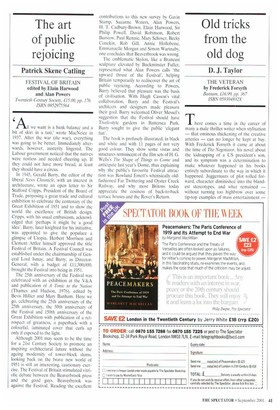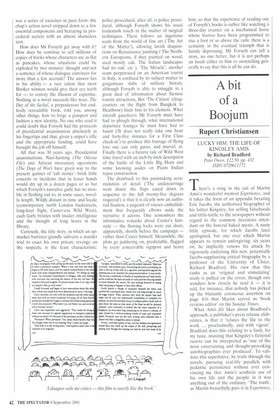Old tricks from the old dog
D. J. Taylor
THE VETERAN by Frederick Forsyth Bantam, £16.99, pp. 367
ISBN 059304892X
There comes a time in the career of many a male thriller writer when stylisation — that ominous thickening of the creative arteries — can no longer be kept at bay. With Frederick Forsyth it came at about the time of The Negotiator, his novel about the kidnapping of a US president's son, and its symptom was a determination to make whatever happened in his books entirely subordinate to the way in which it happened. Juggernauts of plot rolled forward, character diminished into the blandest stereotypes, and what remained — without turning too highbrow over some tip-top examples of mass entertainment —
was a series of exercises in pure form: the chap's action novel stripped down to a few essential components and betraying its procedural secrets with an almost shameless zest.
How does Mr Forsyth get away with it? How does he continue to sell millions of copies of books whose characters are as flat as pancakes, whose situations could be exploded by two minutes' thought and not a sentence of whose dialogue convinces for more than a few seconds? The answer lies in his ability — a rare talent that most Booker winners would give their eye teeth for — to convey the illusion of expertise. Nothing in a novel succeeds like nous. The Day of the Jackal, a preposterous but endlessly rereadable book, told you, among other things, how to forge a passport and fashion a new identity. No one who read it could doubt that Forsyth had the protocols of presidential assassination absolutely at his fingertips and that, given a sniper's rifle and the appropriate funding, could have brought the job off himself.
All that was 30 years ago. Presidential assassinations, Nazi-hunting (The Odessa File) and African mercenary operations (The Dogs of War) have given way to the present quintet of 'tall stories': brisk little conceits or incidents that in lesser hands would dry up in a dozen pages or so but which Forsyth's narrative guile has no trouble in fleshing out to, in some cases, novella length. Wildly distant in time and locale (contemporary north London backstreets, long-haul flight, Custer-era Wild West), each fairly bristles with insider intelligence and the thought of long hours in the library.
Curiously, the title story, in which an upmarket barrister grandly subverts a murder trial to exact his own private revenge on the suspects, is the least characteristic: police procedural, after all, is police procedural, although Forsyth shows his usual trademark touch in the matter of surgical techniques. There follows an ingenious scam from the world of fine art (`The Art of the Matter'), allowing lavish disquisitions on Renaissance painting (`The Northern Europeans, if they painted on wood, used mostly oak. The Italian landscapes had no oak' etc ). 'The Miracle', another scam perpetrated on an American tourist in Italy, is confined by its subject matter to gargantuan slabs of military history, although Forsyth is able to smuggle in a great deal of information about Sienese tourist attractions, But 'The Citizen' (drugcouriers on the flight from Bangkok to Heathrow) finds him in his element. What aircraft gazetteers Mr Forsyth must have had to plough through, what international departure lounges he must have had to haunt (`It does not really take one hour and forty-five minutes for a First Class check-in') to produce this barrage of flying lore one can only guess, and marvel, at. Finally there is a bizarre tale of Wild West time travel with an inch-by-inch description of the battle of the Little Big Horn and some knowing asides on Plains Indian tepee construction.
The drawback to this painstaking accumulation of detail (The undercarriage went down: the flaps eased clown in sequence to the full twenty-five degrees required') is that it is clearly now an authorial fixation, a pageant of rococo embellishment that frequently elbows aside the narrative it adorns. One remembers the informative remarks about Custer's hair style the flowing locks were cut short, apparently, shortly before the campaign — rather than Custer himself. Meanwhile, the plots go juddering on, predictable, flagged by every conceivable signpost and heavy hint, so that the experience of reading one of Forsyth's books is rather like watching a three-day eventer on a mechanical horse whose hooves have been programmed to rise a foot or so above the rails: there is a certainty in the eventual triumph that is faintly depressing. Mr Forsyth can tell a story, no one better, but it is not perhaps an insult either to him or storytelling generally to say that this is all he can do.



































































 Previous page
Previous page